Things I Learned From Publishing My Novel
Five thoughts, five months out.
It’s been exactly five months since my debut novel, NOTHING SERIOUS, was published from William Morrow / HarperCollins. When I first started working on a book, I was thirty-three and had no idea what I was doing. I had never taken a writing class aside from High School English and back then I was more of a physics gal. But as I entered my thirties, a story began to fester and I became obsessed with figuring out how to tell it.
Specifically, I wanted to write a book from the pov of someone who grew up with extreme financial instability. Who spent their early adulthood heads down working practical jobs, people for whom “the arts” were out of the question, who were paying for college on their own and couldn’t afford to explore, make mistakes, or be reckless with their choices. For these people—for me, at least—self discovery came later. If my twenties were spent contorting myself to excel in the hyper-masculine, capitalist world of business and tech in order to pay off loans and establish some loose sense of financial security for myself and my family, my thirties were a breaking out, learning to trust myself and access my desires outside of a reflexive desire for (our centrally patriarchal) societal approval. I wanted to write about a specific kind of thirty-something coming-of-age.
As I’ve written before, it took me a decade of trial and error to ultimately publish my novel. The first book I wrote didn’t sell, but it did—through workshopping, classes, and obsessively reading similar work—teach me how to write. After six years of rejection on that manuscript, I tried again. I wrote a similar later in life coming-of-age story with the same main character, but this time it had a mysterious death carrying the plot forward, threading in themes of revenge and retribution in addition to self-actualization. Eventually, I sold it to a top five publisher and my dream of being a novelist came true.
Now, I’m forty-three and my novel has been out in the world for five months. The first few months were a whirlwind of anxiety, adrenaline, and pride. The next few months felt like a morning-after brick of depression. But almost half a year out, I feel ever so slightly more stable. So I’m sharing a few things I’ve learned along the way.
1. Don’t let them fool you! It really does feel great to publish a book.
I’ve noticed some writers on here, mostly very accomplished writers, have dismissed the notion of publishing a book with a sentiment along the lines of, “publishing should not be the point.” This is a lovely notion, one I theoretically agree with! Of course to focus on the outcome of art is to inevitably compromise the art, etc etc. And yet to have your work read, to be in conversation with others through your writing, is very, very much the point for many of us.
Almost everyone who claims publishing a book is overrated are people for which it seems publishing has become a sort of given, already in the bag, something to take or leave. I will tell you, as someone for whom publishing was very much not an option for a very long time but was desperate to share a specific kind of story, seeing my book on the shelves of Barnes & Noble, at my hometown library, unexpectedly at a bookstore on vacation, still sweeps me away with an overwhelming sense of awe that a stranger may pick this incredibly personal artifact off the shelf and maybe even relate to it.
Not to say the process of publishing isn’t chock-full of disappointment. The biggest of which is that very few books sell. Still, it’s unbelievable to to get messages from women (and even some men!) who understand what I was trying to do withe the novel so fully, who feel seen whether it be in the learned instinct to contort the self for male approval, parsing between desire and expectation, the catastrophe of modern dating, or even just thin frizzy hair struggles. To say nothing of the events! To sit in front of a room and talk about the Word Doc I’ve been chipping away at for years and have people actually listen and even ask detailed questions? It’s like exiting a cave, finally able to breathe, to have your work out there, not just hammering over and over in your head wondering if any of it will make any sense to anyone else.
There is a rare and special feeling a writer gets when someone takes their work seriously. I’ve mostly felt this when a dear friend gives me detailed feedback on a piece. Objectively speaking, most of my pieces don’t matter all that much, but to finish a piece of writing you have to believe very much that it does. And when someone else buys into that same belief, really gets what you’re doing and grapples with it themselves, it’s this intense flash of intimacy and connection you’ve been working for in an otherwise devastatingly lonely space. This is how I felt constantly in those first few weeks post launch and every time I’ve received a message (thank you to everyone who has reached out, it’s by far the best part of all of this) about the book since.
I still have a gaping hole in my soul, but it is ever so slightly less gaping because now there is a book there, too. And that’s not nothing! Actually, it’s very much something.
2. Nothing will ever be right.
If you put your heart and soul into a book, it is very rare that all the different pieces, pieces that are very much out of your control, unlike the actual text which you have labored over for years, will be the way you want them to be. (And even that text, btw, will never be just right.)
Where to begin? The cover, perhaps. As I’ve written before, the cover, for me, was somewhat of a crisis. Style-wise, I wanted it a bit more threatening and adult, in line with the novel. But also, shouldn’t it convey that it’s a San Francisco story, a tech story, a love story, a queer story, a dark almost-thriller kind of story, but also a very human, hopeful story?? I wanted—needed—it to convey All The Things. My agent and editor are angels (and, side note, it still feels INSANE to say “my agent” and “editor,” at Harper-fucking-Collins, casually like that.) But they really are. And they reminded me that a cover can’t possibly and also shouldn’t try to convey the entirety of a book in a single image. Anyway, once I held the hardcover in my hands I fell in love; it was my baby and it was gorgeous.
There is a person in my life who regularly calls herself an “artist.” What do you do for a living? Someone might ask and she will reply, stone-cold, straight-faced, “I’m an artist.” Now, I know, intellectually, that writing is art and I spend most of my waking hours these days writing, and yet if someone were to ask me directly, “Are you an artist?” I’m not sure I’d be able to so much as nod without giggling wildly at my own pretension. Anyway, this woman was appalled that I would accept a cover that was not 100% exactly how I imagined it, that I would let my art be compromised in this way. Unsurprisingly, she got incredibly lucky in her career and has scarcely had to worry about success; she has the option to be demanding. But for most of us, it’s an ongoing balance of when to assert yourself and when to know not to be a dick about it.
Then there’s the audiobook. Does any author listen to their words read by another person and think—YES, this is exactly how I imagined it would sound! Maybe…?? Alas, this was not my reaction. I cannot detail my reaction at any length because I was only physically able to listen to about three lines of my audiobook before I threw my headphones across the room in horror. No offense to the incredibly talented and accomplished narrator who read it—I’ve been told it’s fantastic! Truly. But I’m not sure (short of a ten-year production staring Claire Danes and Jake Gyllenhaal), that it would ever meet the fantasy I harbored in my head.
What else? Everything else, of course. Press, events, film and foreign rights—the whole post-publication phase is all a slow coming to terms with reality. One might advise a person to keep their expectations low. Not me! No way. Pre-publication is full of anxiety, sure, but it’s also gloriously full of hope. This blissful window of hope is extremely rare in writing. Mostly, writing is the excruciating process of managing one’s self-loathing in the face of unending rejection. So when you land a window of possibility, let yourself dream. Don’t expect it all to happen, but expectation is different than hope, and I’m a big fan of hope. I poured over my launch event, for example, for months, and it was a dream come true. Go big, try hard, but if and when things don’t work out exactly the way you expect them to—know that that’s okay, and in fact perfectly normal.
3. Self promotion is hell but it offers the illusion of control.
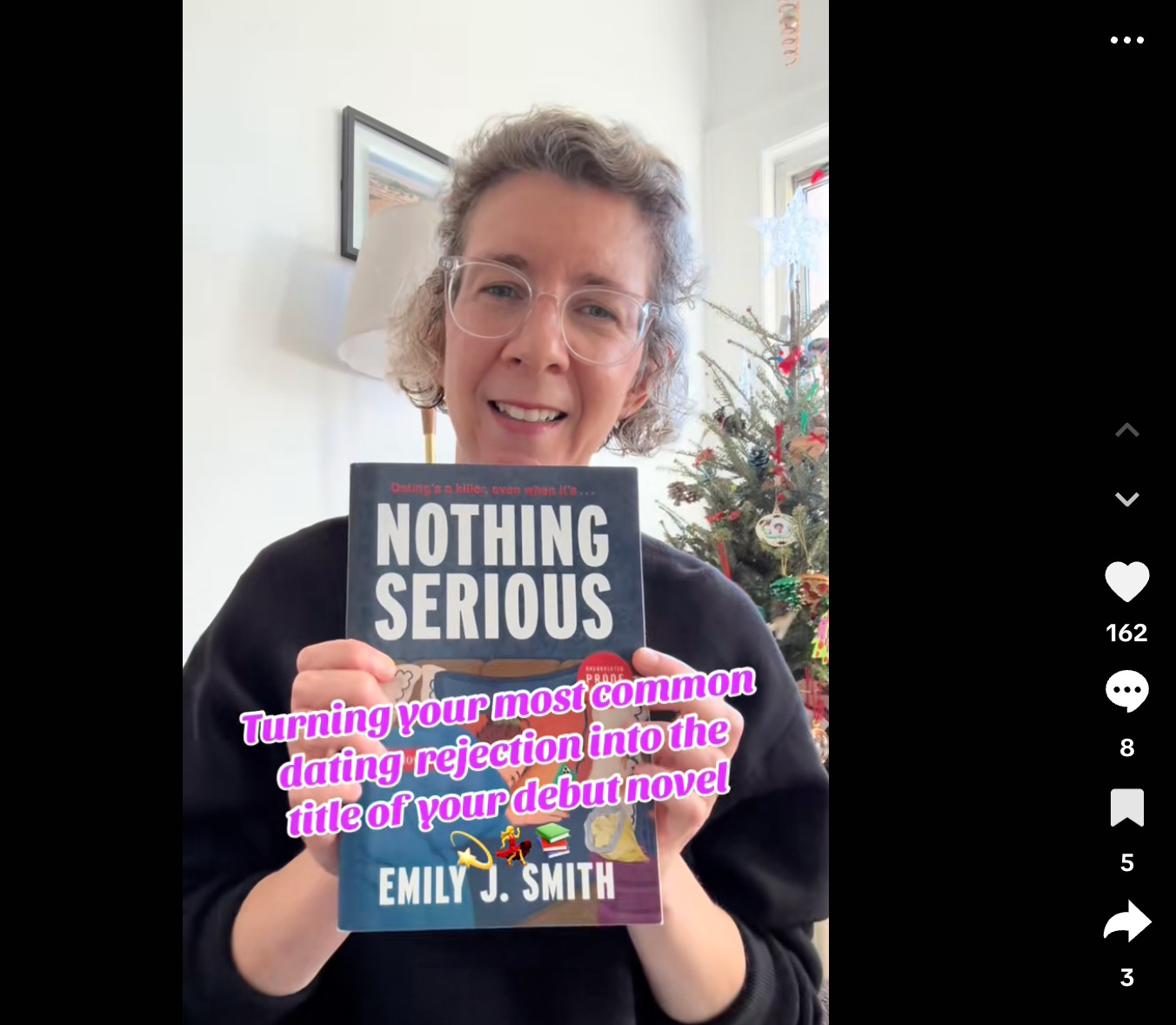
On “pub day,” I texted my dearest writing friend something like: Do I have to post on IG today? Please say no!!
In my mind, this day was akin to a birthday (a big one)—all about me and what I wanted. Every other day I’m chugging along trying to do what I’m supposed to. But on my special day, I want to whatever the f* I want. I deserved it, damnit. And what I wanted most of all was to stay off social media.
YES OF COURSE YOU DO!!!!!! she replied immediately.
And so you write all the thoughts swirling around your head, that feel impossible to describe, especially when your entire body is shaky with nerves, but you try your best and you’re grateful to your friend for keeping your head straight as always.
Do some people genuinely not care about the curation of self they share with the world? Or possibly even enjoy that sharing? I have to imagine that there is at least some type of (young) person out there for whom this is true. For me it is hell. To put oneself online in that way feels inherently performative, and so even if I try to make it low-stakes and casual, I end up performing a version of low stakes and casual, which is in itself a sort of earnestness and quite possibly the very worst kind.
But I feel as if I have to do it. Because if you’re not promoting your book, who else will? Yes, my publisher gave me PR support—which I’m endlessly grateful for and did result in some excellent press—but, like most authors, it was limited to mostly the standard, mass outreach, unless you’re willing to dish out 8-12k per month to get your own independent publicist, which most authors cannot afford.
The best part about social media (and maybe also the worst) is that it gives you the illusion of control. In reality, you have very little control. You do have control over what you put out there—posting to socials regularly, reaching out to every relevant writer and reviewer you’ve ever loved, pitching essays like it’s your job, doing everything you can to make a splash. For months, I put my old MBA skills to work managing spreadsheets galore in an attempt to get galleys sent and press secured. But you do not have control over how it will land, how people will respond, what will actually get picked up. It’s all a bunch of spaghetti against the wall at the end of the day and so you do as much as you can without breaking your soul.
That last bit is important. I went outside my comfort zone with social media for sure, but I did not attempt to become some TikTok content creator with new reels every other day (I did about three TikToks and that was enough). I posted a reel once or twice on IG and felt near suicidal urges by the end of the (four hour!!) creation process, further exacerbated by its abominable ‘like’ count. Never again. If whoring my image out to the world every day with fluffy repetitive content is what it takes to be a successful novelist, then I wildly miscalculated what being a novelist entails—drawn to it primarily for the seclusion and utter absence of visual content—and perhaps it’s not what I want to be after all. Point is, there is always a line; find it and respect your own.
4. Books themselves don’t make money, but publishing provides momentum.
If I did the math, it’d probably work out to getting paid a few cents an hour to write my book. If anyone is writing literary fiction for the money—please stop immediately. If I then factored in expenses for publishing and tour (its own post), not to mention the opportunity cost of it all, it would certainly net out negative. Book sales are very rarely enough for authors to make real money. This is why, as I said at the beginning, most people who have no financial safety net (i.e. parental support, a side career, a spouse), cannot even consider the idea of writing because they are too busy trying to financially survive. But if you are able to somehow carve out time for this very demanding endeavor that makes very little money, publishing does offer a form of credibility, almost like a degree (also a privilege), which can lead to other things.
For example, I’m now teaching a class! The month-long workshop is designed for professionals who want to explore creative writing, but don’t know exactly where to begin. Unlike most workshops, you do not have to share your writing with the class (a requirement that prevented me from taking classes for years, so embarrassed I was by my own work) and instead I work 1-1 with students alongside the weekly sessions to understand and support their goals and ease them into a practice. Essentially, it’s the class I wish I had when I started. I piloted three cohorts this summer with about six people in each, and it was amazing. I’m teaching it again in September, apply here if interested!
Publishing a book also helped me gain momentum with this newsletter, and, importantly, connect with other writers I admire. For most authors, it’s not a direct path to a sustainable income, certainly not after your first book, but aside from all the warm amazing feelings mentioned above, practically, it can be a kind of calling card that really does help move your writing career forward.
5. Community is everything.
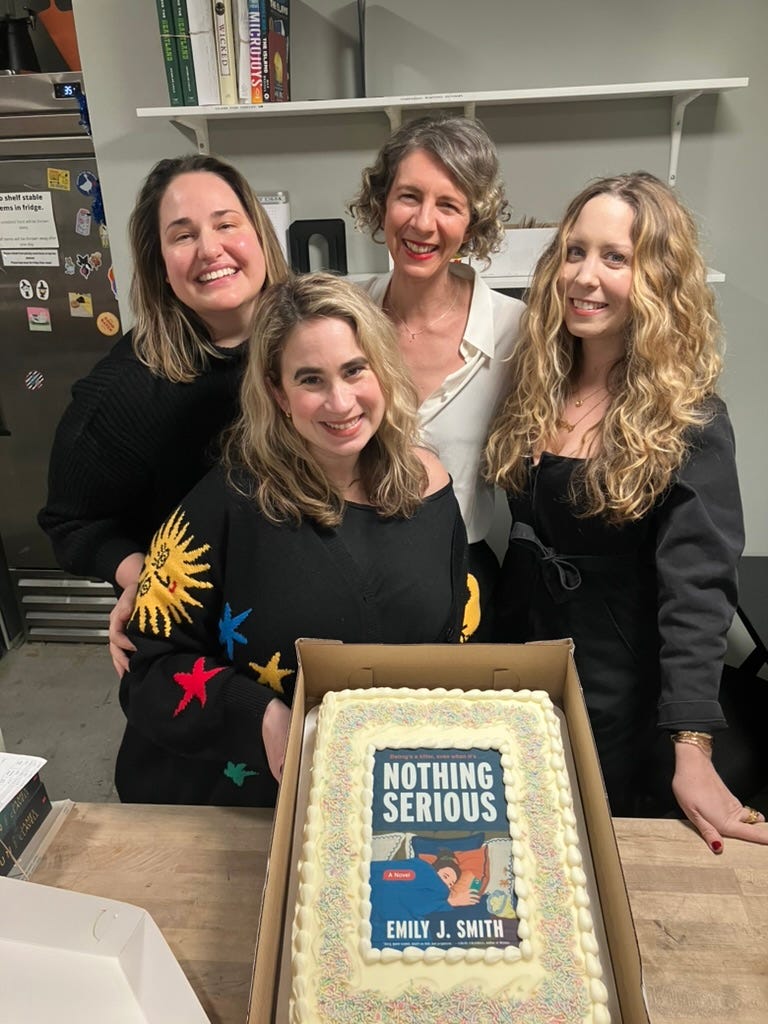
I’ve written about this at length but the publishing process made it even more clear and honestly I just can’t say it enough: friends are the most important thing. Even with a big five publisher, there is so much you have to do yourself—requesting blurbs, finding conversation partners for events, pitching press. This is not to say build community with an agenda. The people who supported me through this launch are people who I’ve been exchanging shitty first drafts with for years on end. But it is enormously helpful to have those friends, real friends, when the time comes to celebrate something big, when it comes time to call on people for help.
And I’m not just talking about writer-friends. I took my sister and mom on book tour with me because—yes, even in my forties—I needed all the emotional support 🫣. Meanwhile, friends from every crack of life came out to events, driving hours, even flying to be there. I have no desire to get married or have kids—the milestones we usually associate with adult celebration—and so I went big with my book launch as a way to reconnect with friends from all different parts of my life and don’t regret it. I think I cried at least once at every event. There were many times I had to keep my eyes down because looking up at at people I hadn’t seen in years might break me. The last five months have been an emotional rollercoaster and certainly not without disappointment, but a few months out and slightly more stable, I can see what an amazing ride it all was and I one-hundred-percent have my community to thank for that.



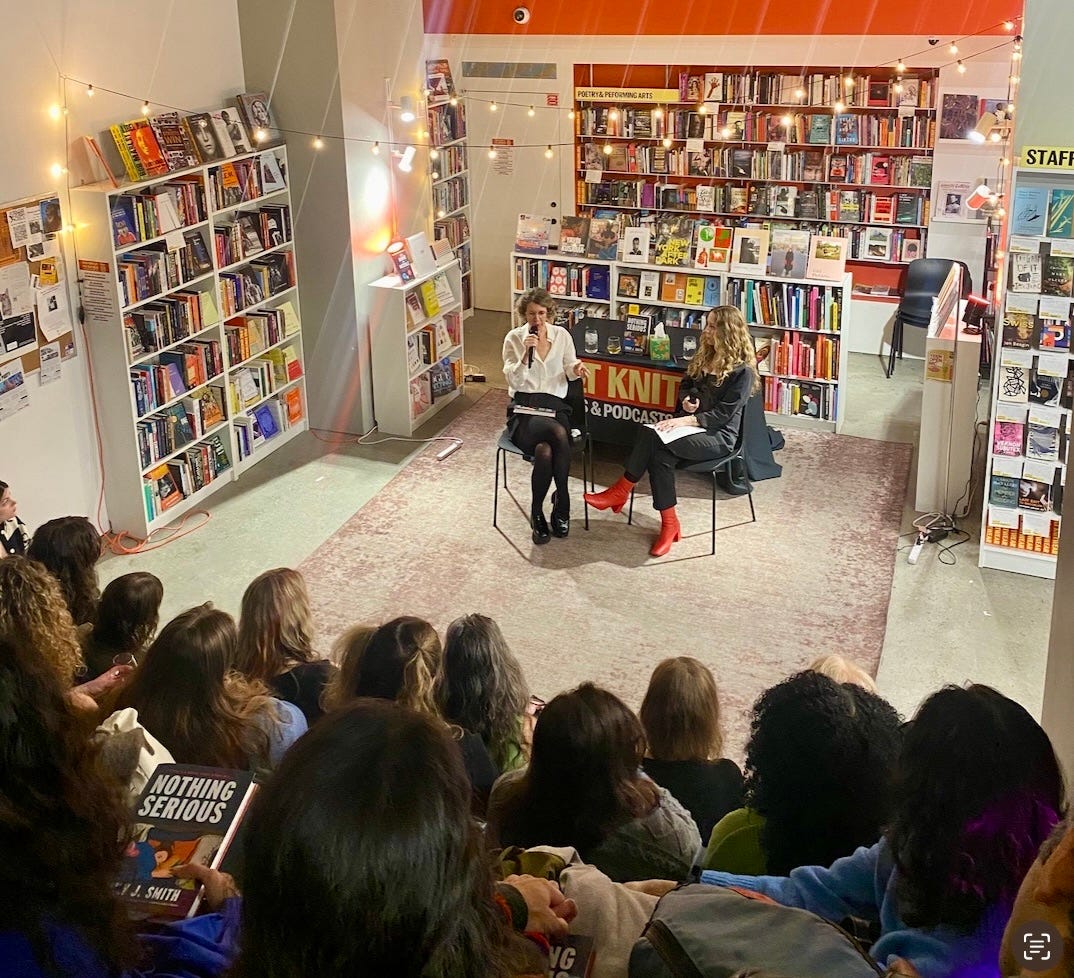
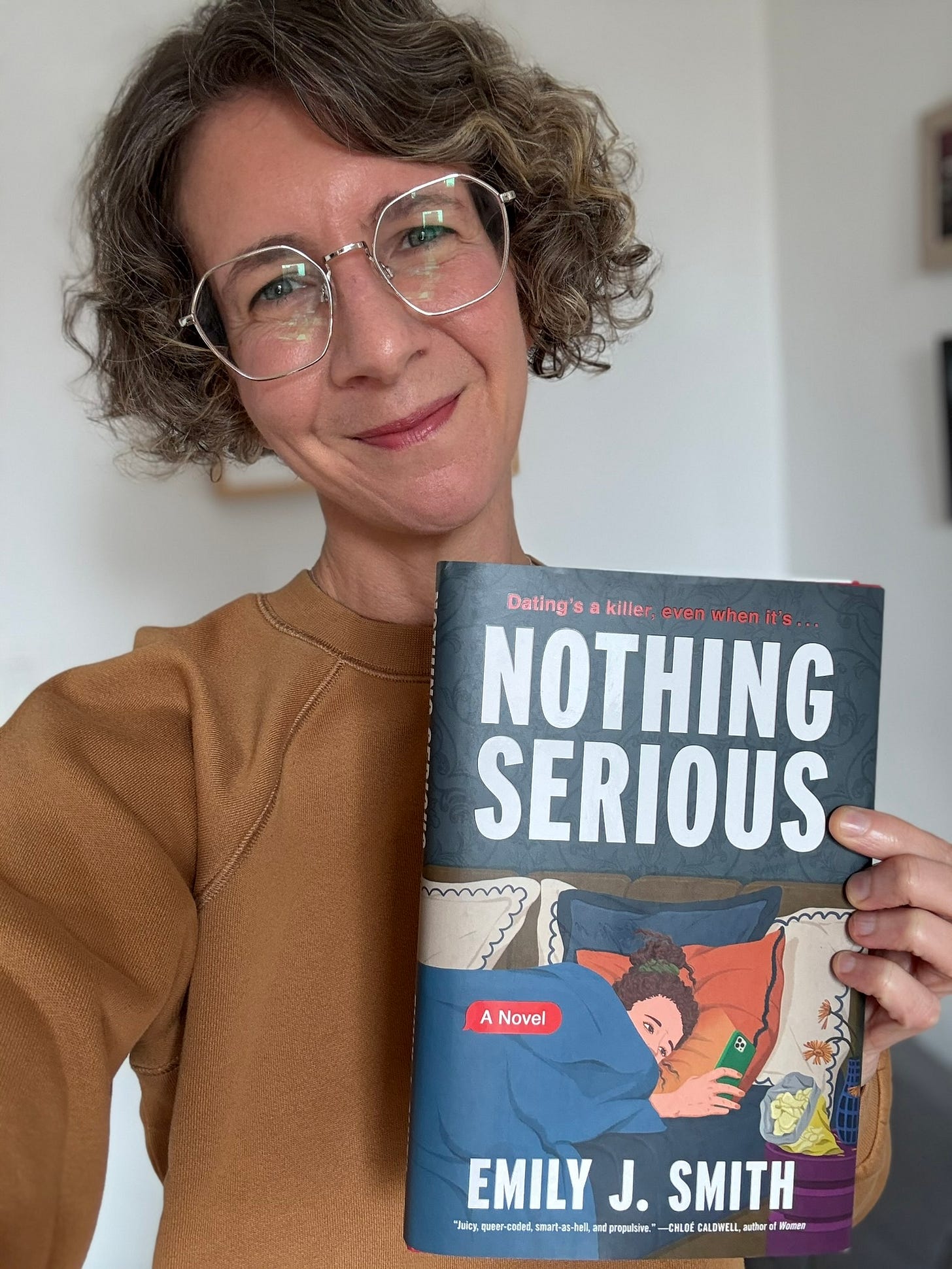
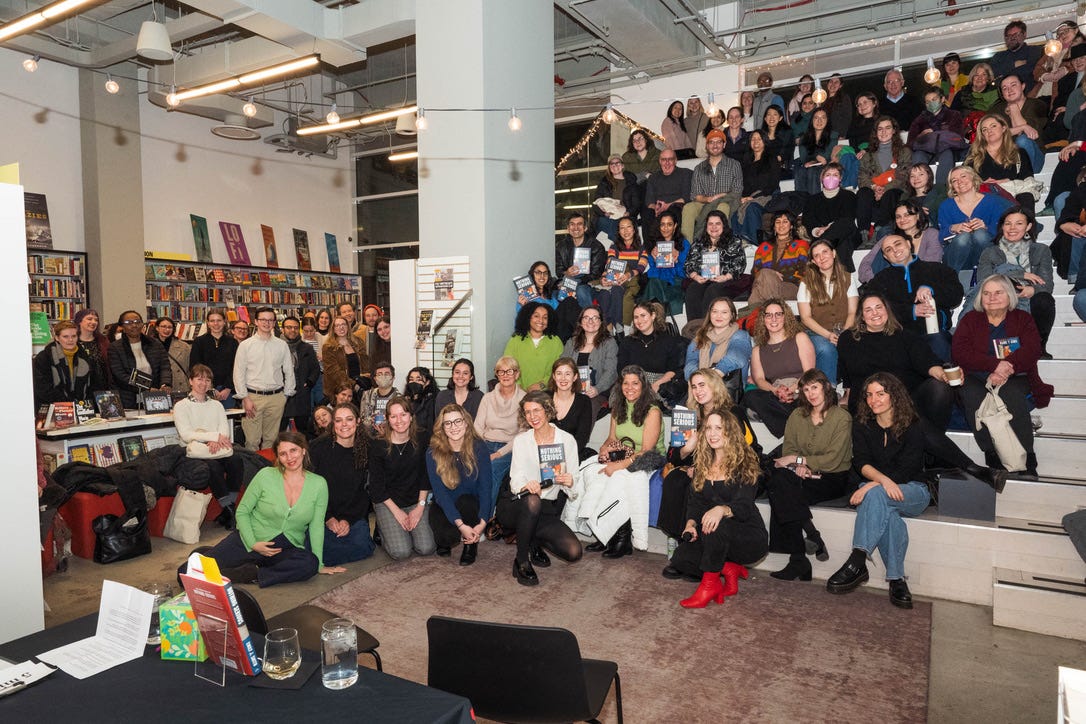
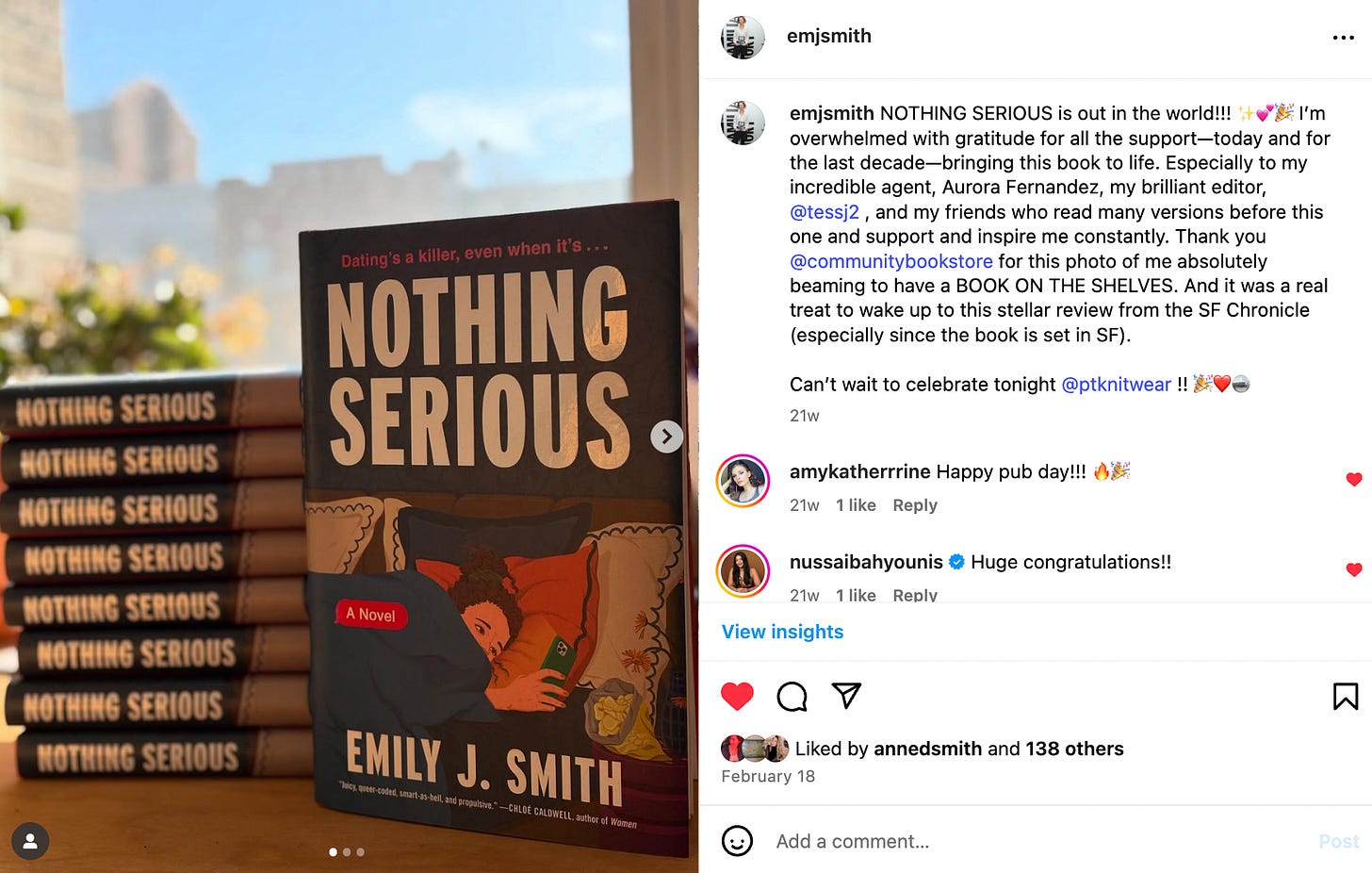
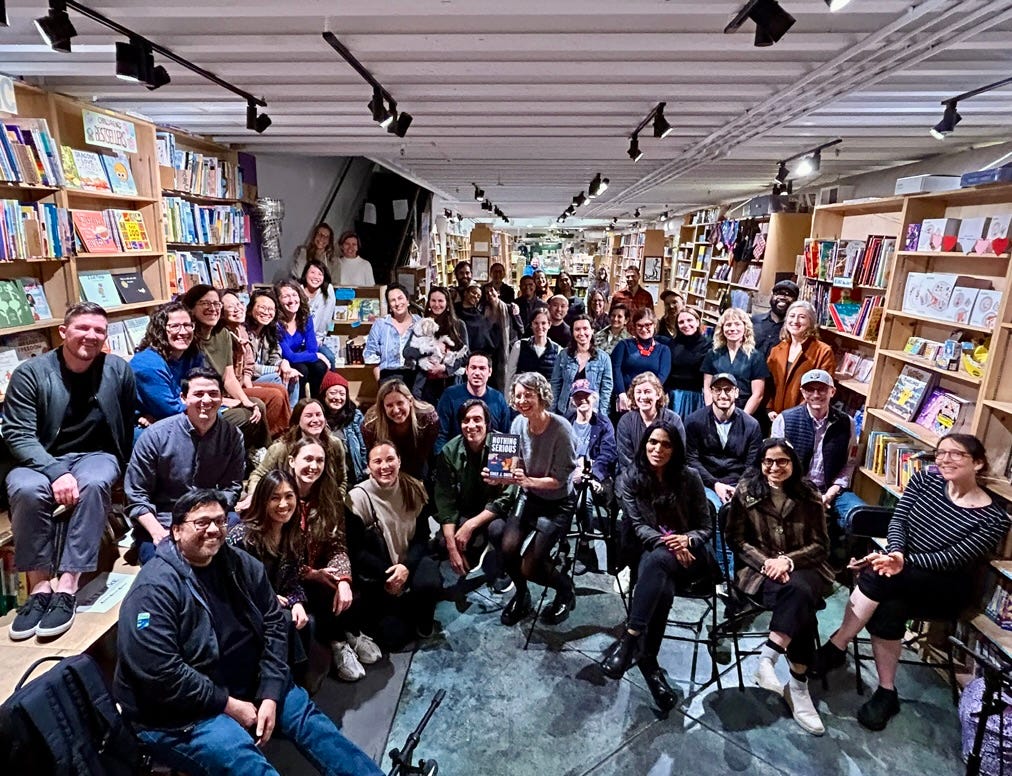
So grateful that you stuck with it and your stories are out in the world, Emily!!
If your reading this and want to find your footinf with writing - get that application in for Emily's course! Don't miss the opportunity to get coaching, practical tips, and kickstart your writing community!!!
Appreciate this post!